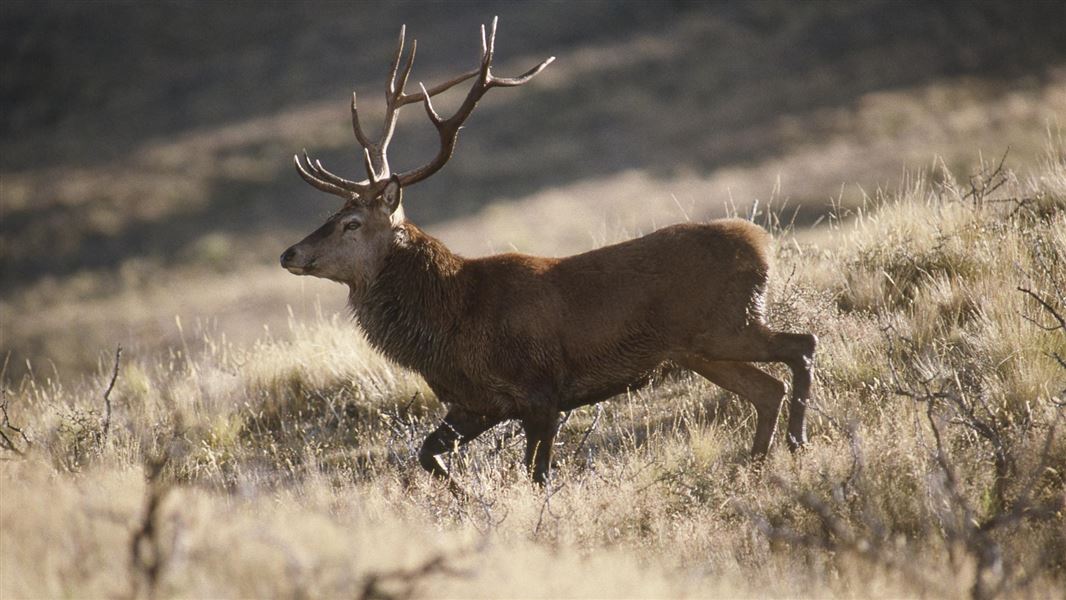Deer video prompts complaints to SPCA


Reports of deer roaming the streets have surfaced online recently. Photo: DOC/Gordon Roberts.
Video footage of an incident involving a deer and a vehicle posted to Facebook has led to complaints being laid with the SPCA.
An SPCA spokesperson says many of the public would have found the footage deeply distressing and disturbing to witness. It has since received a complaint about the alleged incident and is assisting police with their investigation and cannot make further comment.
Police have also confirmed they are following lines of inquiry into the Marsden Valley matter, including exploring social media and other footage, to determine next steps.
Speaking generally, the SPCA spokesperson says the organisation is opposed to the use of any inhumane method of controlling or managing wild animals. When wild animals are killed for food, they say it must be done efficiently and humanely by an experienced and skilled hunter or trapper. Lethally controlling animals by shooting is often considered a relatively more humane practice than other methods of control, although the humaneness of this method is influenced by the skill and competency of the operator and selecting an appropriate ammunition for the species targeted.
A humane shooting is one that should result in the least amount of time between when the animal is shot and its death. Where animals are shot and injured but not killed, they must be immediately tracked down and killed.
It also points out that the Animal Welfare Act 1999 provides protections for wild animals and creates offences for their ill-treatment. Penalties range from one-year imprisonment and/or $50,000 fine through to five-years imprisonment and/or $100,000 fine, (or higher fines if the offence is committed by a body corporate). Ill treatment is defined as any act or omission that causes an animal to suffer pain or distress that is not reasonable or necessary in the circumstances.
There have been other incidents of roaming deer in the region recently. On 21 March there were reports on social media of a deer “in the middle of the road” in Enner Glynn, and reports of about 20 deer on Marsden Valley Rd the day before.
Meanwhile, Nelson City Council along with Ngāti Koata and Tasman Pine Forests Ltd, have contracted a team of professional hunters, Trap and Trigger Ltd, to carry out a cull of wild deer, pigs and goats across both front and backcountry reserves.
The cull will take place on Wednesday 1 May to Saturday 18 May when reserves will be closed to the public. It is the fifth year the council has carried out a cull in the reserves and acting group manager community services, Martin Croft, says recent reports of deer, goats and pigs near tracks and households indicate numbers are increasing again to the point where a cull is required.
Front country hunting will take place in Eureka Park and the Atmore, Tantragee (including Codgers), Brook Conservation, and Marsden Valley reserves. Hunting will also occur on nearby Ngāti Koata land around Fringed Hill, Groom Creek, and Codgers. Hunters will use suppressed (silenced) rifles with subsonic (quiet) ammunition in areas closer to residential zones. Dogs, thermal imaging, drones, and helicopters will also be used to complete their work. During the cull, the reserves will be open to the public in the weekends.
Back country hunting will take place in the Maitai and Roding Water reserves which will be fully closed during the cull apart from the Coppermine Trail which will be open on weekends.
Martin says meat will be retrieved from the hunt in coordination with Ngāti Koata hunters, who will work alongside Trap and Trigger Ltd to retrieve carcasses that are easily accessible.
He says annual culls are necessary to protect native flora and fauna from pests, and keeping the number of ungulates (hooved animals) in reserves as low as possible needs to be an ongoing effort to keep numbers under control and allow the forests time to regenerate.
In Tasman, the numbers of deer, goats and pigs have also been increasing in rural areas. Tasman District Council communications officer, Tim O’Connell, says the council is hearing anecdotally from landowners that the number of deer, goats and pigs in particular are increasing, though in rural areas more than residential.
He says the council is also getting more enquiries regarding control, but as there is no requirement for ungulates to be controlled in the Regional Pest Management Plan (RPMP), it does not get actively involved. It has referred some people to the NZ Deerstalkers’ Association which is very active in the area.
He says pigs are the worst problem for rural and semi-rural Tasman residents.
“There is a real issue if they turn up in a residentially-zoned area, as you cannot use a firearm to dispatch the animal, unless you have a special clearance to do so by the NZ Police.”
